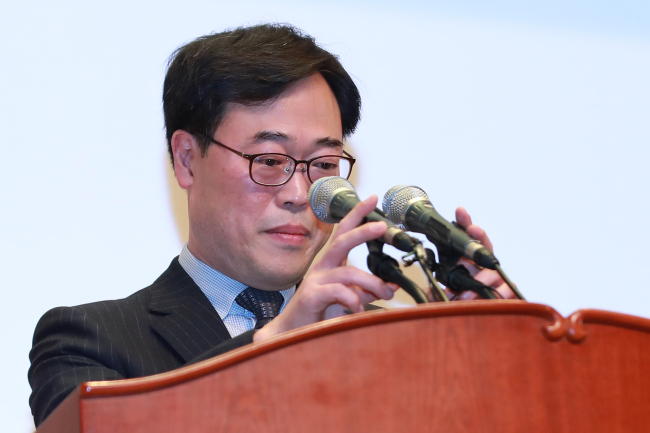South Korea’s presidential office said on Sunday it is not considering dismissing the head of the country’s financial watchdog amid the criticism that Financial Supervisory Service chief Kim Ki-sik spent taxpayer money on his business trip abroad while serving as a lawmaker three years ago.
Cheong Wa Dae also denied the allegation it exercised influence over the Korea Institute for International Economics‘ termination of funding for the US-Korea Institute at Johns Hopkins University. Kim was one of the first lawmakers to raise the issue when he chaired the parliamentary policy committee in 2015.
Since taking office on April 5, Kim has been in the hot seat over the allegation that he spent a total of 30.77 million won ($29,085) during a 10-day business trip which including a visit to Washington DC, where he inspected the management of the US-Korea Institute.
 |
Financial Supervisory Service chief Kim Ki-sik. Yonhap |
“We have not considered (removing Kim from office) at all,” a Cheong Wa Dae official told reporters under the condition of anonymity.
Meanwhile, Kim apologized for making an overseas trip that “goes beyond the standard of the ordinary people,“ while reiterating that he did not take actions that favored KIEP, the agency that sponsored the trip.
The presidential office explained Saturday that the trip was made at the request of the state-sponsored KIEP, which announced its decision to cut off funds for USKI on Friday.
When asked whether Cheong Wa Dae was involved in the process, the official reiterated the decision to cut off funding had been made not only within the administration, but also by the lawmakers across the aisle.
“USKI has been the subject of an overhaul over the past 10 years. Despite an annual budget of more than two billion won, they only published one or two pages of research. In their performance evaluation, they received a low grade,” the Cheong Wa Dae official said.
The government’s decision to cut off funds for the USKI has sparked outrage among conservative lawmakers and US scholars working there, such as USKI chairman Robert L. Gallucci, who also served as a chief negotiator during the 1994 North Korean nuclear crisis.
By Yeo Jun-suk(
jasonyeo@heraldcorp.com)








